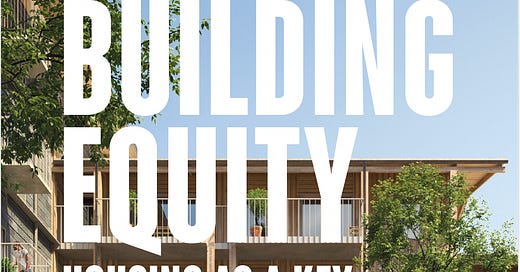Building equity: Housing as a key to a low-carbon society
Decarbonisation & housing affordability must go hand in hand 🤝
Europe faces the urgent task of decarbonizing its extensive building stock while ensuring affordable housing and well-being for citizens. By no means an easy task and success relies on collaboration to drive innovation and ensure the necessary speed and scale. To unlock the potential industry plays a key part. Hence, this document aims to empower action by recognizing the need for systemic change while highlighting the valuable work already being done by NGOs and pioneering industry players with the purpose of activating innovation capabilities and nurturing a culture of social value creation to catalyze transformative change within the housing sector.
The housing sector significantly impacts economic prosperity, health outcomes, and well-being. Yet, in today’s urban context, housing as a basic human right is often overshadowed by market dynamics, regulatory hurdles, and socio-economic disparities. By 2023, 10,6% of Europeans in cities were overburdened by housing costs (Eurostat, 2023), and with a heightened awareness from the political system and increasing demand for solutions from citizens, it is clear there is an urgent need for new approaches. Compounding these challenges, the EU’s carbon budget for the built environment is critically low, with just ten years left at current emission rates to limit global warming to 1.5°C. With research suggesting that to meet the Paris Agreement targets, the carbon content of new buildings must be reduced by up to 94% by 2050 (Dark Matter, 2023).
Addressing these intertwined issues requires immediate, coordinated action, and the EU must tackle the rising cost of living while pursuing environmental goals. Because the ongoing cost-of-living crisis, exacerbated by increasing interest rates, material prices, and other economic pressures, makes affordable housing more critical. However, if successful, the housing sector has the potential to lead Europe’s transition to a sustainable, decarbonized future while tackling housing affordability, providing not just shelter but the physical surroundings for children and citizens at large to live, learn, and thrive.
So, throughout the first six months of 2024, we have convened pan-European industry voices, as well as leading NGOs and collected their perspective on both barriers and opportunities and compiled and combined them with inspirational cases in this whitepaper to empower action within the context of the current realities — such as investor responsibilities, increased interest rates, and increasing material prices. While both barriers and opportunity where many, the need and prospect for collaboration between public and private stakeholders was omnipresent.
A WAY FORWARD
Solving the challenge of adequate housing for all while decarbonizing the European building stock requires embracing both the complexity of the problem and the urgency of delivering solutions. With a steady belief that a just transition lens can potentially accelerate the pace of decarbonization by engaging politicians and citizens at large rather than being a barrier, our aim is to enable and celebrate action within the practical context of today’s industry. Collaboration, innovation, and a commitment to housing as a human right are essential to building a more equitable, sustainable, and inclusive housing landscape. Values based public-private partnerships along with community engagement that explore co-responsibility are central to this vision. The public sector can offer things such as regulatory support, funding, and policy frameworks, while the private sector brings innovation, efficiency, and investment.
By demonstrating best practices, we aim to show that while the problem seems big and agency limited, there are many emerging innovative solutions ready for further advancement and adaptation. We strive to provide cracks of light in the existing system, highlighting that a just transition is not only necessary but possible.
In short, this whitepaper highlights housing’s untapped potential, aiming to inspire industry stakeholders to innovate and drive change. Co-responsibility and cross-sector collaboration can accelerate the development and implementation of sustainable housing solutions, ensuring these efforts are scalable and sustainable in the long term. By unlocking innovation capabilities and fostering a culture of social value creation, we can catalyze transformative change within the housing sector and build a future where housing is a beacon of hope and opportunity for all. So, it’s time to join forces across the private and public sectors by finding common ground. We can provide the just transition for residential real estate by debunking myths and working together.
- The above is my intro in the new whitepaper: Building equity: Housing as a key to a low-carbon society. Over the first six months of 2024, we at BLOXHUB, in collaboration with ULI and the Laudes Foundation, convened pan-European industry voices to gather their insights on barriers and opportunities within social value in housing.
Join us this Wednesday in person or online for the launch of the whitepaper Building Equity: housing as a key for a low carbon society. Sign up for in person attendance or online here
xx Ditte




